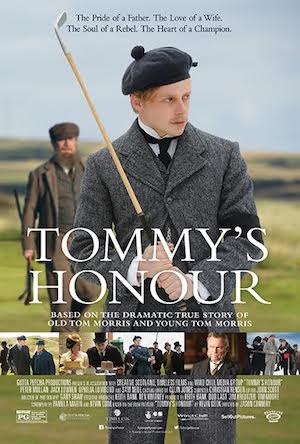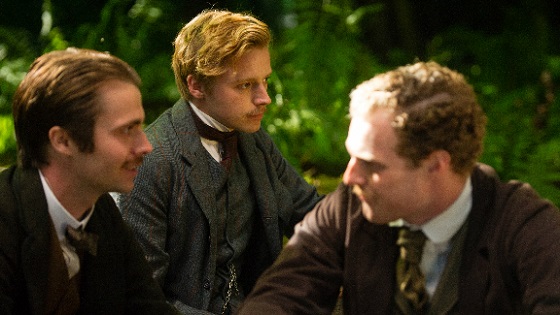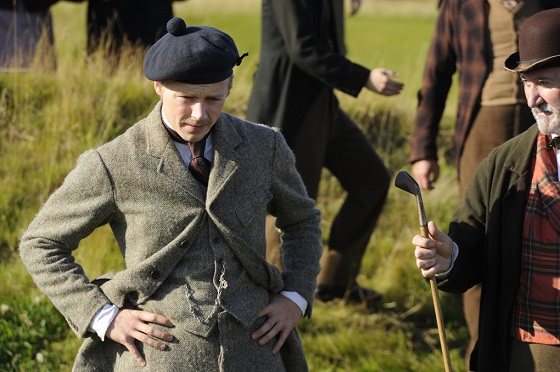[Rating: Swiss Fist]
It’s had to make just a sports movie: it is. Most of them, even the very best, have a rival plot about the athlete finding inner peace through love in the midst of physical hardship, which is entirely reasonable since training montages can bring audiences only so far. Rocky, Bull Durham, Goon, Happy Gilmore…hell, even Hoosiers had a love interest B-plot mixed in, and all of them made it work with awesomeness to spare. So it seems odd that Tommy’s Honour would stumble so much on this point, since it follows much of the classic sports-film formula … except when it doesn’t.
Tommy’s Honour stars Jack Lowden as Tommy Morris Jr., a real-life 19th century Scottish golfer who is widely credited as the modern game’s first star. Tommy not only came up with such play-based innovations as the backspin shot, but also paved the way for competitive golf as a viable profession. Before he’d reached the age of twenty-two, Tommy had won four consecutive Open championships (a feat unmatched to this day), and was arguably the first person in history to make his living as an independent golfing professional.
What’s more, Tommy was a really funny, engaging, good-natured sportsman who got along with his competitors, and had few detractors. Although he had to deal with some classism (more on that in a moment) to reach the heights he eventually did, the man and the movie about his life contains little in the way of adversity. This isn’t a problem in and of itself, yet without any real roadblocks to contend with, the film often feels a bit rudderless. What drives sports films in almost every instance is a sense that the protagonist(s) is an underdog, and has to struggle to achieve the hard-earned victory attained at the end. Yet Tommy’s Honour starts with its main character as something of a prodigy, and only builds upon that greatness as it progresses.
Sure, Tommy loses from time to time, but this is often balanced against the fact that he’s begun to negotiate an appearance fee up front, assuring that he’ll get paid no matter the outcome of the match. This was a big deal in the 1870s, when the movie is set, as players were often at the mercy of rich benefactors who used the golfing contests as a means to wager amongst themselves. Tommy’s skill, drawing power, and business acumen changed the entire dynamic of professional golf, giving the players, not the observers, the power in the relationship.
This shift in the professional game’s power structure wasn’t without some push-back, as the movie does show, since players like Tommy had previously been little more than the hired hands of the private clubs that hosted these matches. Tommy’s father, Tom Sr. (Peter Mullan), is a groundskeeper and golf instructor who plays at the behest of the wealthy club members he works for. Tom Sr. feels lucky to be paid for something so trivial as playing a game, and thinks his son should count his blessings that he’s landed such a gig from birth. Tommy pushes ahead with his dreams, however, and becomes a successful pro in his own right, living off his own earnings rather than the scraps thrown to him by rich onlookers.
During his ascent into golf superstardom, Tommy also makes time to fall head over heels for a smart, confident, capable woman, Meg (Ophelia Lovibond), who takes all of five minutes to fall in love with the kid and become his staunchest supporter. Tommy and Meg’s love story comes without conflict for much of the picture, which makes this B-plot minimally engaging at best, and a distraction at worst. As a result, Tommy’s Honour finds itself not even halfway through its second act with much of the core components of what might have been its central conflict(s) already resolved (Tommy’s already a great golfer, maybe the best, and he’s won the heart of his beloved with almost no struggle).
And while there is a fair amount of tragedy to confront in the third act, none of it feels very connected to what’s come before by way of cause and effect. True to life though it may be, sure: it just doesn’t make for an especially compelling narrative as presented.
Which is not to say that Tommy’s Honour is a bad movie: far from it. Lowden and Mullan are spectacular as Morris Jr. and Sr., respectively, and Lovibond does a great job asserting herself as an active agent in the story rather than just a spectator. Shot on location in Scotland, and with the brogue of that region nakedly on display, it feels and looks like an earnestly crafted love letter to golf and the people who gave birth to it. Despite the gloomy reputation of the region, director Jason Connery regularly features daylight and bright lighting set-ups to give everything a notably vibrant look.
The thing is, it’s just not that engaging. People often bemoan the injection of drama and conflict in historic biopics, which is often a fair assessment of an attempt to glitz up an already interesting story. And while Connery and screenwriter Pamela Marin and Kevin Cook might not have needed to make anything up, it may have been wise to shuffle things around to make the existing drama more compelling. Opening this week, Tommy’s Honour is an interesting peek behind golf’s historical curtain, and features an engaging hero with a story worth telling. In better hands, either behind the camera or in the editing room, it could be great: a hole in one, you might say. Right now, however, it’s little more than a par effort.
The film opens in theaters nationwide tomorrow, and is playing at AMC Town Center 20, Glenwood Arts, and Cinemark Palace at the Plaza 15 in Kansas City.









Comments on this entry are closed.